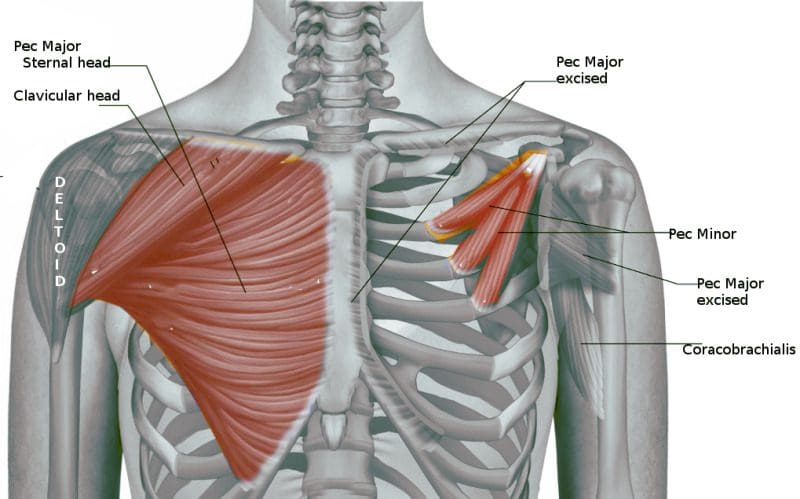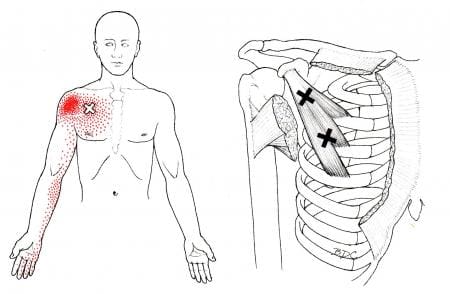Table of Contents
Introduction
The chest has the pectoralis major muscle that works with the upper half of the body that provides mobility and power. The pectoralis major also surrounds the clavicle skeletal structure and works with the thoracic spine. The chest allows mobility to the arms and stability to the shoulders while working together with the shoulder and arm muscles. Many individuals utilize the upper body more when working out, lifting, or carrying objects from one place to another. This causes the muscle to become overused and succumb to injuries that can affect the functionality of the chest and invoke pain-like symptoms in the body. One of the chest muscles affected by pain is the pectoralis muscles, especially the pectoralis minor muscle. Today’s article looks at the pectoralis minor muscle, how myofascial pain affects the pectoralis minor, and how to manage myofascial pain associated with the pectoralis minor. We refer patients to certified providers specializing in chest pain therapies to aid many people suffering from trigger point pain affecting the minor muscles of the pectoralis. We brief patients by referring them to our associated medical providers based on their examination when appropriate. We indicate that education is a great solution to asking our providers profound and complex questions at the patient’s request. Dr. Alex Jimenez, D.C., notes this information as an educational service only. Disclaimer
The Pectoralis Minor Muscle

Have you been experiencing pain in your upper-mid back? Do you feel like your chest is feeling compressed constantly? Do you feel the tension in your shoulders that makes it difficult to reach behind your back? Most of these symptoms are signs that many individuals are developing myofascial pain along the pectoralis muscles, especially the pectoralis minor. The pectoralis minor muscle is a thin triangular-shaped muscle below the pectoralis major. It has a crucial part of the chest as it helps stabilize the scapula (the shoulder blades) and is in front of the thoracic wall of the spine. The pectoralis minor is also part of the respiratory muscle group that works with the lungs. The pectoralis minor muscle has many functions for the shoulder blades, which include:
- Stabilization
- Depression
- Abduction or Protraction
- Internal Rotation
- Downwards Rotation
When environmental factors begin to affect the lungs and cause respiratory issues in the body, the surrounding respiratory muscle group also gets involved, causing the body to be hunched over.
Myofascial Pain Affecting The Pectoralis Minor

When environmental factors begin to affect the lungs, it causes the respiratory muscles to contract and become compressed. This is just one of the many factors that can affect the pectoralis minor muscle. The other factor is that the pectoralis minor muscle may be short in the chest and when individuals try to reach behind their backs. This causes the pectoralis minor muscle to to be overstretched and develop myofascial pain or trigger points along the muscle fibers. The book, “Myofascial Pain and Dysfunction,” written by Dr. Travell, M.D., described the pain from myofascial pain associated with the pectoralis minor to be similar to cardiac pain. This is known as referred pain caused by myofascial pain syndrome and it can be a bit difficult to diagnose since it can mimic other chronic issues. Studies reveal that shortening or any sort of tightness of the pectoralis minor is one of the potential biomechanical mechanisms that is associated with an altered scapular alignment which causes pain and shoulder movement impairments. Overusing the pectoralis minor muscles creates tiny nodules that can affect the stability of the shoulders and causes upper-mid back problems in the thoracic region of the spine.
An Overview Of Trigger Points On The Pectoralis Minor- Video
Have you been experiencing difficulty inreaching behind your back? Do you feeling your body becoming more hunched over than usual? Or have you been experiencing chest pain constantly? These pain-like symptoms are caused by myofascial pain associated with the pectoralis minor muscle. The pectoralis minor muscle helps with the stability of the shoulders and studies reveal that when the presense of myofascial trigger points are linked to shoulder and upper body disorders, it can increase the risk of overlapping conditions that trigger points can mimic. Myofascial trigger points are a common complaint as it can significantly impact a person’s daily activites by causing the taut muscle band to be tender or hypersenitive. When this happens, it can lead to issues of muscle imbalance, weakness and impaired motor function. Thankfully, there are various techniques that can help reduce the pain symptoms and issues in the pectoralis minor muscle, while mananging the trigger points. The video above explainshow to tell when your chest muscles are tight and various tests to know when the pectoralis muscles (both the minor and major) are being affected by trigger points.
Managing Myofacial Pain Associated With Pectoralis Minor

When dealing with chest pains associated with myofascial pain along the pectoralis minor, there are many techniques they can incorporate to prevent myofascial pain from causing further damage to the muscle itself and the surrounding muscles. Various chest stretches can help gently loosen the stiff muscles, warm the pectoralis minor, and improve mobility to the chest and shoulders. Correct posture can help prevent the body from being hunched over constantly and let the surrounding muscles and the pectoralis minor relax. If the pain is unbearable, studies reveal that treatments like dry needling and palpations on the pectoralis minor muscles can help manage the pain caused by trigger points. This kind of treatment allows the muscle to release the trigger point and, combined with a hot or cold pack, can reduce the chances of myofascial pain from forming again in the muscle.
Conclusion
Underneath the pectoralis major muscle, the pectoralis minor is a thin triangular-shaped muscle that helps stabilize the shoulder blades and is located in the front of the thoracic wall of the spine. This tiny muscle is part of the respiratory muscles that have a causal relationship with the lungs and can succumb to environmental factors that can lead to the development of myofascial pain or trigger points on the pectoralis minor. Myofascial pain associated with the pectoralis minor muscle can mimic cardiovascular issues and invoke pain in the muscle. Fortunately, various treatments can help relieve and manage myofascial pain from re-occurring in the pectoralis minor.
References
Bagcier, Fatih, et al. “Three Simple Rules in Pectoral Muscle’s Trigger Point Treatment, Which May Be a Cause of Chest Pain: Position, Palpation, and Perpendicular Needling.” American Board of Family Medicine, American Board of Family Medicine, 1 Nov. 2020, https://www.jabfm.org/content/33/6/1031.long.
Baig, Mirza A, and Bruno Bordoni. “Anatomy, Shoulder and Upper Limb, Pectoral Muscles.” In: StatPearls [Internet]. Treasure Island (FL), StatPearls Publishing, 11 Aug. 2021, https://www.ncbi.nlm.nih.gov/books/NBK545241/.
Morais, Nuno, and Joana Cruz. “The Pectoralis Minor Muscle and Shoulder Movement-Related Impairments and Pain: Rationale, Assessment and Management.” Physical Therapy in Sport : Official Journal of the Association of Chartered Physiotherapists in Sports Medicine, U.S. National Library of Medicine, Jan. 2016, https://pubmed.ncbi.nlm.nih.gov/26530726/.
Ribeiro, Daniel Cury, et al. “The Prevalence of Myofascial Trigger Points in Neck and Shoulder-Related Disorders: A Systematic Review of the Literature.” BMC Musculoskeletal Disorders, BioMed Central, 25 July 2018, https://www.ncbi.nlm.nih.gov/pmc/articles/PMC6060458/.
Travell, J. G., et al. Myofascial Pain and Dysfunction: The Trigger Point Manual: Vol. 1:Upper Half of Body. Williams & Wilkins, 1999.
Disclaimer
Post Disclaimer
Professional Scope of Practice *
The information herein on "The Pectoralis Minor Being Affected By Myofascial Pain" is not intended to replace a one-on-one relationship with a qualified health care professional or licensed physician and is not medical advice. We encourage you to make healthcare decisions based on your research and partnership with a qualified healthcare professional.
Blog Information & Scope Discussions
Welcome to El Paso's Premier Wellness, Personal Injury Care Clinic & Wellness Blog, where Dr. Alex Jimenez, DC, FNP-C, a Multi-State board-certified Family Practice Nurse Practitioner (FNP-BC) and Chiropractor (DC), presents insights on how our multidisciplinary team is dedicated to holistic healing and personalized care. Our practice aligns with evidence-based treatment protocols inspired by integrative medicine principles, similar to those on this site and our family practice-based chiromed.com site, and focuses on restoring health naturally for patients of all ages.
Our areas of multidisciplinary practice include Wellness & Nutrition, Chronic Pain, Personal Injury, Auto Accident Care, Work Injuries, Back Injury, Low Back Pain, Neck Pain, Migraine Headaches, Sports Injuries, Severe Sciatica, Scoliosis, Complex Herniated Discs, Fibromyalgia, Chronic Pain, Complex Injuries, Stress Management, Functional Medicine Treatments, and in-scope care protocols.
Our information scope is multidisciplinary, focusing on musculoskeletal and physical medicine, wellness, contributing etiological viscerosomatic disturbances within clinical presentations, associated somato-visceral reflex clinical dynamics, subluxation complexes, sensitive health issues, and functional medicine articles, topics, and discussions.
We provide and present clinical collaboration with specialists from various disciplines. Each specialist is governed by their professional scope of practice and their jurisdiction of licensure. We use functional health & wellness protocols to treat and support care for musculoskeletal injuries or disorders.
Our videos, posts, topics, and insights address clinical matters and issues that are directly or indirectly related to our clinical scope of practice.
Our office has made a reasonable effort to provide supportive citations and has identified relevant research studies that support our posts. We provide copies of supporting research studies upon request to regulatory boards and the public.
We understand that we cover matters that require an additional explanation of how they may assist in a particular care plan or treatment protocol; therefore, to discuss the subject matter above further, please feel free to ask Dr. Alex Jimenez, DC, APRN, FNP-BC, or contact us at 915-850-0900.
We are here to help you and your family.
Blessings
Dr. Alex Jimenez DC, MSACP, APRN, FNP-BC*, CCST, IFMCP, CFMP, ATN
email: [email protected]
Multidisciplinary Licensing & Board Certifications:
Licensed as a Doctor of Chiropractic (DC) in Texas & New Mexico*
Texas DC License #: TX5807, Verified: TX5807
New Mexico DC License #: NM-DC2182, Verified: NM-DC2182
Multi-State Advanced Practice Registered Nurse (APRN*) in Texas & Multi-States
Multi-state Compact APRN License by Endorsement (42 States)
Texas APRN License #: 1191402, Verified: 1191402 *
Florida APRN License #: 11043890, Verified: APRN11043890 *
Colorado License #: C-APN.0105610-C-NP, Verified: C-APN.0105610-C-NP
New York License #: N25929, Verified N25929
License Verification Link: Nursys License Verifier
* Prescriptive Authority Authorized
ANCC FNP-BC: Board Certified Nurse Practitioner*
Compact Status: Multi-State License: Authorized to Practice in 40 States*
Graduate with Honors: ICHS: MSN-FNP (Family Nurse Practitioner Program)
Degree Granted. Master's in Family Practice MSN Diploma (Cum Laude)
Dr. Alex Jimenez, DC, APRN, FNP-BC*, CFMP, IFMCP, ATN, CCST
My Digital Business Card
Licenses and Board Certifications:
DC: Doctor of Chiropractic
APRNP: Advanced Practice Registered Nurse
FNP-BC: Family Practice Specialization (Multi-State Board Certified)
RN: Registered Nurse (Multi-State Compact License)
CFMP: Certified Functional Medicine Provider
MSN-FNP: Master of Science in Family Practice Medicine
MSACP: Master of Science in Advanced Clinical Practice
IFMCP: Institute of Functional Medicine
CCST: Certified Chiropractic Spinal Trauma
ATN: Advanced Translational Neutrogenomics
Memberships & Associations:
TCA: Texas Chiropractic Association: Member ID: 104311
AANP: American Association of Nurse Practitioners: Member ID: 2198960
ANA: American Nurse Association: Member ID: 06458222 (District TX01)
TNA: Texas Nurse Association: Member ID: 06458222
NPI: 1205907805
| Primary Taxonomy | Selected Taxonomy | State | License Number |
|---|---|---|---|
| No | 111N00000X - Chiropractor | NM | DC2182 |
| Yes | 111N00000X - Chiropractor | TX | DC5807 |
| Yes | 363LF0000X - Nurse Practitioner - Family | TX | 1191402 |
| Yes | 363LF0000X - Nurse Practitioner - Family | FL | 11043890 |
| Yes | 363LF0000X - Nurse Practitioner - Family | CO | C-APN.0105610-C-NP |
| Yes | 363LF0000X - Nurse Practitioner - Family | NY | N25929 |
Dr. Alex Jimenez, DC, APRN, FNP-BC*, CFMP, IFMCP, ATN, CCST
My Digital Business Card





 Again, We Welcome You.
Again, We Welcome You.
Comments are closed.